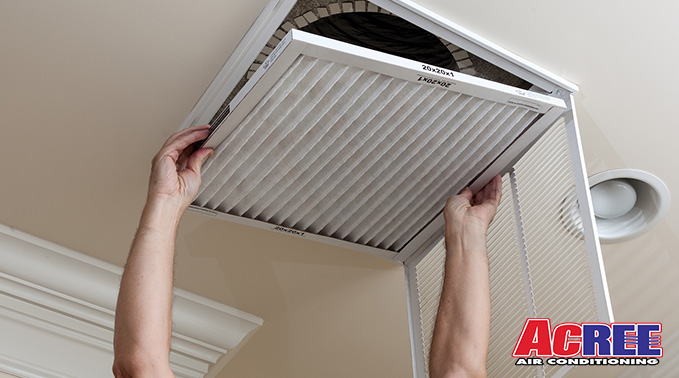
We seek cleanliness in our society. There is a plethora of videos on the web about how to organize and clean your home. So it should only make sense that we would want clean air as well as a clean surface in our Tampa homes! When the professionals at Acree Plumbing, Air & Electric think of air quality, the first thing that comes to mind is the air filter in your heating and cooling system. It’s not only healthy for you; it’s also healthy for your HVAC unit as they keep dust from getting into your system! There are many different types of air filters and different ratings that go with them.
So what difference does the rating make?
The rating is categorized from 1 to 16 on the MERV (minimum efficiency reporting value) scale. This number is determined by comparing the filter’s efficiency to the particle size it can capture. The higher the MERV’s number goes up, the more particles it can catch at higher efficiencies.
For the average person, this may not make much of a difference unless you deal with pet dander or allergies. However, higher rated filters are beneficial health-wise to those who are chronically ill, have respiratory conditions, or live with family members who have health issues.
Here we’ll take a look at the full range of filters and effects the ratings have on performance.
The Range of MERV Ratings
6-8:
These are the bare minimum but also the cheapest options. They catch only a fraction of the largest particles, dust and debris, from your air. Mostly this filter is there for the protection of your HVAC system, with the added bonus of not circulating most of the dust back into your home. It is recommended you get at least a slightly higher rating than this, especially if anyone in your home has a respiratory condition.
8-10:
This range of filter is commonly used in homes. It provides far more protection while still remaining fairly affordable. Much more of the large particle range and roughly half of smaller particles like pollen, mites, and spores (mildew and mold) get captured with this rating. These ones work as cheaper options for allergy sufferers.
11-13:
These air filters are the perfect in-between (from the most expensive and the cheapest). Nearly all of the largest particles to the smallest, including dander, are much more effectively removed. It’s highly recommended to get filters within this range if you have heavy allergies or have children who suffer from allergies.
13-14:
The best of the best for residential heating and cooling systems; these filters are often used in schools to provide clean teaching environments. Residentially, this filter is beneficial to those who are sickly or have immune deficiencies and need the cleanest and most sterile environment possible. These knock out a majority of all the particles above, with the added removal of most smoke, viruses, and bacteria.
14 and higher:
These are typically not used residentially but for medical facilities like hospitals and pharmaceutical manufacturing. They are heavy duty filters that are large and bulky, but they remove nearly all of the above air contaminants.
When making a decision to purchase air filters, weigh in the health of you and your family. If anyone in your home deals with even mild allergies, it could be worth going one step higher just for one month and seeing if there is a change in condition. Should there be no change, you can always go back down a rating and be none the worse for wear!
Have any other HVAC questions? Get in touch with the professional team at Acree Plumbing, Air & Electric! We’ve been Tampa’s native experts for decades and have the knowledge and the tools to meet all of your heating and cooling needs. Call us any day of the week between 7AM and 11PM at (813) 703-1273 or schedule service using our online form today!
